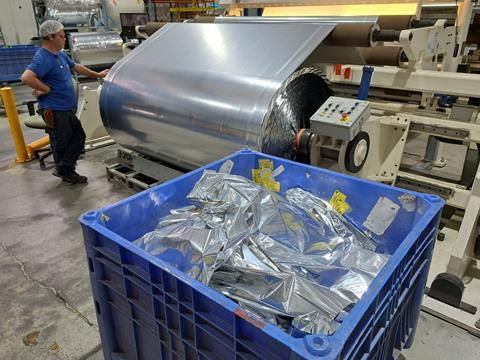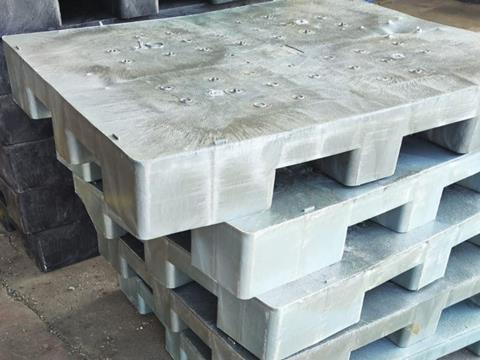
Roded Recycling Industries and Aran have partnered on a combined recycling process, creating a raw material from agricultural plastic film waste and Bag In Box laminates.
The process aims to create raw materials that reduce landfill and support a circular economy, as the two types of post-consumer waste require a significant effort to recycle alone.
Roded specializes in recycling agricultural plastic waste. The company says post-consumer agricultural waste is one of the most difficult plastic wastes to recycle. The greenhouses cover and mulch PE films, exposed to dirt, sand, and dust. Changes in the temperature during the day and night, winter and summer, contribute to the polymer’s shrinking and expanding cycles and the penetration of microscopic-level pollutants into the polymer.
Roded states the films undergo prolonged exposure to pesticide materials and solar radiation, causing unwanted phenomena in the polymer such as degradation, loss of elasticity, and brittleness. Washing and mechanical dry-cleaning improve the results, but flow enhancers or lubricants need to be added in the form of paraffin oil or PE-based wax to the recycling process.
It adds that laminate is also difficult to recycle, as these films consist of a combination of different polymers, PE and PA or PET, which are not compatible, and recycling them together is challenging.
“These films are part of the BIB (Bag In Box) that we manufacture at Aran,” says Lior Mor, CEO of Aran Group. “We reduce their use, but for some food products, they are necessary. As part of our commitment to recycling and circular economy, we invest efforts to find an environmentally friendly end-of-life solution for these types of films, whether it is industrial waste from the production processes of organizations, or post-consumer waste.”
Reportedly, the collaboration between Roded and Aran revealed that combining the two waste types and recycling them together produces an improved raw material. An in-depth study found the low-level aluminum from the metalized films has a positive effect on the melt flow of the material, acting as a flow enhancer and a reinforced material that contributes to the final product.
The process is apparently in patent-pending processes with initial pilot facilities at Roded’s factory in Israel. It relies on unique cleaning, shredding, processing, and manufacturing technologies, including mold design with release mechanisms of volatile materials generated in the recycling process.

“Reusable plastic pallets, produced by pressing, are an ideal application for these recycled materials,” says Roded COO Eitan Mansur. “They replace wood pallets commonly used in the industry and are less susceptible to contamination.”
He adds that “this is the first pallet that presents a negative carbon footprint. The recycled material contains inherent foaming which lowers its density and enables more energy-efficient logistical transportation.”
The carrying capacity of the pallet is 4 tons when placed on the ground and 1.2 tons when stored on high shelves, which are safe for secondary packaging of food products.
The next step of this project is to recycle post-consumer BIB waste. “We intend to collect the outer bag of the packaging, which does not come in direct contact with the food. This layer is the massive one, and it’s about 70% of the weight of the entire plastic packaging,” says Luis Hernandez, CEO of Aran Europe.
“Aran Group will lead the establishment of a reverse logistics system for collecting PCR BIB from its customers. We are submitting the project to the European Union’s Horizon program and hope to bring about positive change in the field of sustainable BIB,” he concludes.
At the start of this year Sappi unveiled two new flexible packaging papers made from renewable raw materials, aiming to unlock recyclable alternatives to fossil-based packaging. The Seal Light Gloss paper has coating on its reverse side for heat sealability and can apparently be recycled easily via the paper waste stream. It is designed to cut down on the use of plastics in secondary packaging for products such as confectionary, or in primary packaging for products that do not require a barrier.
In the same month, Interzero’s dual system, Interseroh+, announced it was welcoming consumer goods startup Share into its Recycling Alliance in a move set to help close its raw material loops. Through the Alliance, Interseroh+ will provide its portfolio of packaging recycling services in hopes of optimizing packaging recyclability, developing new formulations for plastic applications using post-consumer recyclates, and more.
If you liked this story, you might also enjoy:
The Brief: How viable is biorecycling for plastics?
Report: How the top brands are progressing on packaging sustainability
The Brief: Using ocean-bound plastic in packaging – how, why and should we?














No comments yet